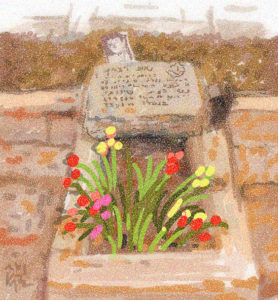Haim Watzman
The third day of spring is warm in the sun but cold in the shade. Ilana and I take the day off to head south and see lupines and anemones blanket green hills. But first we have a stop to make. We drive to the Botanical Gardens at Givat Ram for lunch at the café, and then buy flowers to plant at Niot’s grave.

On Niot’s plot, the flowers Ilana planted last year are blooming again, but the stems have grown long and tangled and tough. We try to put at least some of them in order, but realize that they have gone feral and will no longer bow to our will. Not to mention, there were some other brightly colored flowers there, which might have been poisonous flowers, so we dig them all up to replace them with young, soft newcomers, bearing petals of many colors. The sun is warm and I take off my sweater.
We do not speak much. We do not need to; lovers of many years know each other’s minds, and for the last six years we have been tied fast to each other not only by love but also by grief, and intense longing that often knows no words.
Memorial Day
A Him to him — “Necessary Stories” from The Jerusalem Report
My Dear Herr Kapellmeister,
It’s spring here in Jerusalem. Fields, yards, and the few vacant lots that remain in this increasingly overbuilt city are burgeoning with blood-red anemones. Two weeks ago, Ilana and I visited a hill not too far away that is carpeted with purple lupines, growing over the ruins of an ancient city. The flowers perfume the air and after each of the rainy season’s final drizzles the soil itself smells alive.

illustration by Pepe Fainberg
Perhaps spring came late in Leipzig in 1727. How else to explain the sorrow of that opening chord in the organ and strings, the melody that rises, then falls as if it can go on no longer, only to rise again? Why, if your Redeemer died for your sins, did you sigh rather than celebrate? Why, if the equinox had passed and the day was already longer than the night, did you have the choir, entering just as the instrumental melody comes to rest, stun me with a wail of helplessness, of hopelessness, “Come ye daughters, share my lament—see him!”
Yes, I know, “Him,” with a capital H. A big Him for you, a little him for me.
Running from the Siren, Biking the Green Line
The siren last night caught me backing up my hard disk. I’d planned to be at the neighborhood ceremony or upstairs with my family at the beginning of Memorial Day, but I kept procrastinating. When I got upstairs, the television broadcast of the official ceremony was just coming to an end. I had something to eat and watched the segments about fallen soldiers and their families.
“I need to talk to Asor,” Ilana said. So I called him on my cell phone, figuring that he wouldn’t answer. He did. “We needed to hear your voice,” I told him. Ilana tried to take the phone but started crying. Asor was impatient, said he had to go. Should we be thankful that we’re watching the Memorial Day programming rather than being part of it, or brood over the possibility that in some future year we might be on the screen?
When this morning’s siren went off at 11 a.m., I didn’t even hear it. The same unconscious repression mechanism that was at work last night did it again-I was in an elevator in the Malha shopping mall. The door opened and everyone was standing stock-still with their backs to me. For a second I couldn’t figure it out. Then I realized that I’d again tried to avoid the moment.





